
Frontiers in Computer Science
Scope & Guideline
Advancing knowledge at the intersection of technology and society.
Introduction
Aims and Scopes
- Artificial Intelligence and Machine Learning:
The journal publishes research on AI methodologies, including deep learning, reinforcement learning, and machine learning applications across various domains such as healthcare, cybersecurity, and education. - Human-Computer Interaction (HCI):
A core area of focus, HCI research addresses user experience, interaction design, and the societal implications of technology, emphasizing the importance of designing inclusive and accessible systems. - Cybersecurity:
The journal features studies on cybersecurity frameworks, threat detection, and mitigation strategies, particularly in relation to emerging technologies like IoT and autonomous systems. - Data Science and Big Data Analytics:
Research exploring data management, analysis techniques, and visualization methods is central to the journal, reflecting the growing importance of data-driven decision-making in various fields. - Virtual and Augmented Reality:
The exploration of immersive technologies and their applications in education, therapy, and social interaction is a significant focus, highlighting the innovative use of VR and AR. - Quantum Computing:
With a rising interest in quantum technologies, the journal includes research on quantum algorithms, hardware, and applications, reflecting the cutting-edge developments in this domain. - Robotics and Autonomous Systems:
This area covers the design, implementation, and evaluation of robotic systems, including human-robot interaction and the integration of AI in robotics.
Trending and Emerging
- AI-Enhanced Human-Machine Interaction:
Research focusing on the integration of AI in enhancing human-machine interaction is on the rise, emphasizing the need for systems that can understand and respond to human emotions and behaviors. - Sustainability and Green Computing:
There is an increasing emphasis on sustainability in computing, with studies exploring energy-efficient algorithms, eco-friendly technologies, and the impact of computing on environmental issues. - Data Privacy and Ethical AI:
As concerns over data privacy grow, research addressing ethical considerations in AI and data governance is becoming more prominent, reflecting a societal push for responsible technology. - Multimodal Interaction Technologies:
The exploration of multimodal interaction, including the integration of visual, auditory, and haptic feedback in user interfaces, is gaining attention, pushing the boundaries of how users engage with technology. - Health Informatics and Digital Wellbeing:
Research on health informatics, including the use of AI in healthcare and the design of technology for mental well-being, is trending, showcasing the intersection of technology and health. - Blockchain and Decentralized Systems:
The exploration of blockchain technology and its applications beyond cryptocurrencies, particularly in security and transparency in various sectors, is emerging as a significant area of research.
Declining or Waning
- Traditional Software Engineering Practices:
Research focusing on classical software engineering methodologies appears to be waning, possibly due to the rise of agile and DevOps approaches that prioritize iterative development and rapid deployment. - Basic Usability Studies:
There has been a noticeable decrease in publications centered solely on basic usability studies, as the field shifts towards more complex interactions and user experiences involving AI and multimodal systems. - Standard Security Protocols:
The focus on traditional security protocols without consideration of emerging threats and technologies is diminishing, as the field evolves to address more sophisticated and adaptive cybersecurity challenges. - Generalized Educational Technology:
Research that merely discusses educational technology without specific applications or innovations is less prevalent, as the journal favors more targeted studies that demonstrate unique contributions to the field. - Legacy Computing Systems:
As the focus shifts towards cutting-edge technologies, research on legacy systems and their limitations is becoming less prominent, indicating a trend towards exploring more contemporary computing solutions.
Similar Journals
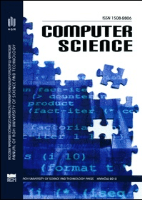
Computer Science-AGH
Fostering Innovation Through Open Access KnowledgeComputer Science-AGH, published by the AGH University of Science & Technology Press in Poland, is an esteemed open access journal that has been disseminating high-quality research since 2004. With ISSN 1508-2806 and E-ISSN 2300-7036, this journal focuses on a diverse range of areas within the computer science discipline, including but not limited to Artificial Intelligence, Computational Theory, Computer Graphics, and Networks. While it currently holds a Q4 ranking across several categories as of 2023, it actively promotes research that contributes to the academic community's understanding and evolution in the field. The journal's commitment to open access ensures that vital research is accessible to a wider audience, fostering collaboration and innovation. With its comprehensive focus and strategic publication goals, Computer Science-AGH plays a crucial role in advancing the frontiers of computer science research and education, making it an invaluable resource for researchers, professionals, and students alike.

KSII Transactions on Internet and Information Systems
Connecting Ideas, Transforming Knowledge in Information Systems.KSII Transactions on Internet and Information Systems is a leading academic journal dedicated to advancing the fields of Internet technology and information systems. Published by the KSII-Kor Soc Internet Information, this journal has established itself as a significant contributor to research since its inception in 2007, with a focus on innovative solutions and methodologies in computer networks and communications as well as information systems. With a Category Quartile of Q3 in both fields for 2023, it ranks in the 44th percentile among its peers according to Scopus, making it a reputable platform for authors to share their findings. While available in print, the journal also promotes open access, ensuring broad dissemination of research findings. The editorial team is committed to maintaining high scholarly standards and relevance, inviting contributions from researchers, professionals, and students eager to push the boundaries of knowledge in today's rapidly evolving digital landscape. For those engaged in or studying these dynamic fields, the KSII Transactions on Internet and Information Systems remains an invaluable resource for cutting-edge research.
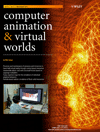
COMPUTER ANIMATION AND VIRTUAL WORLDS
Pioneering Research in Virtual Worlds and Computer Graphics.COMPUTER ANIMATION AND VIRTUAL WORLDS, published by Wiley, is a pivotal journal in the fields of Computer Graphics and Computer-Aided Design, as well as Software. With a focus on the intersection of technology and creativity, the journal provides a platform for researchers and professionals to share innovative studies, new methodologies, and insights that shape the future of computer animation and virtual environments. Currently holding a Q2 category in Computer Graphics and a Q3 in Software for 2023, it ranks #63 out of 106 in its niche, highlighting its influence and relevance in the academic community. Though the journal operates under a subscription model, it also offers options for open access, ensuring that a broader audience can engage with groundbreaking research. The journal has been publishing continuously since its inception in 2004 and looks forward to further contributions as it moves towards its 20th anniversary in 2024. Whether you are a seasoned researcher, an industry professional, or a student eager to explore these dynamic fields, COMPUTER ANIMATION AND VIRTUAL WORLDS is an essential resource for advancing knowledge and innovation.
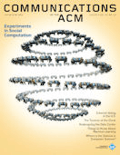
COMMUNICATIONS OF THE ACM
Connecting Ideas, Inspiring InnovationCOMMUNICATIONS OF THE ACM, an esteemed journal published by the Association for Computing Machinery, has been at the forefront of the field of computer science since its inception in 1958. With an impressive impact factor and recognized as a top-tier Q1 journal in its category, it is currently ranked 10th out of 232 journals in the general computer science category according to Scopus rankings. This journal provides a vital platform for researchers, professionals, and students to disseminate innovative ideas and advancements across various domains of computing. Although it does not offer open access, the journal remains accessible through institutional subscriptions, furthering its reach and influence within the academic community. As researchers continue to explore the rapid evolution of technology, COMMUNICATIONS OF THE ACM serves as an essential resource for high-quality research, fostering knowledge advancements and collaborative discourse within the ever-expanding world of computer science.

JOURNAL OF INFORMATION SCIENCE AND ENGINEERING
Bridging Disciplines in Information Science and Engineering.JOURNAL OF INFORMATION SCIENCE AND ENGINEERING, published by the Institute of Information Science in Taiwan, is a pivotal platform for the dissemination of innovative research in the multidisciplinary fields of information science and engineering. Established in 1993, the journal primarily focuses on areas such as library and information sciences, human-computer interaction, hardware and architecture, as well as computational theory and software development. Despite holding a current Q4 ranking in several categories, the journal demonstrates significant potential for growth, particularly in computation and software systems, as evidenced by its Scopus rankings and percentiles. Researchers, professionals, and students will find this journal to be an invaluable resource to stay abreast of evolving theories and technologies in information science. The journal is accessible through traditional subscription models, fostering a broad academic outreach. It serves to enhance knowledge-sharing and collaboration within this dynamic and ever-evolving field.
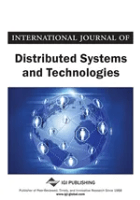
International Journal of Distributed Systems and Technologies
Exploring the Frontiers of Distributed Technologies.Welcome to the International Journal of Distributed Systems and Technologies, a prominent academic platform published by IGI Global dedicated to advancing the field of distributed systems and technologies. With an ISSN of 1947-3532 and an E-ISSN of 1947-3540, this journal, established in 2010 and continuing through 2024, offers a unique venue for researchers, professionals, and students to disseminate their findings in the realms of computer networks, communications, hardware, and architecture. Despite its current placement in the Q4 quartile for both computer networks and communications and hardware and architecture categories in 2023, the journal is committed to fostering innovative solutions and interdisciplinary collaboration that can drive future advancements. Although not open access, contributions to this journal not only receive rigorous peer review but also have the potential to significantly impact the community, underscored by a focus on applicable research that addresses the emerging challenges in technology. As part of a rich repository, the journal invites you to explore its latest issues and join in shaping the future of distributed systems.

Frontiers of Computer Science
Connecting Scholars to the Frontiers of Digital DiscoveryFrontiers of Computer Science is a leading peer-reviewed journal dedicated to advancing the field of computer science through the publication of high-quality research articles, reviews, and theoretical discussions. Published by HIGHER EDUCATION PRESS, this journal has gained significant recognition, currently boasting a prestigious impact factor and ranking in the Q1 quartile for both Computer Science (miscellaneous) and Theoretical Computer Science categories in 2023. With a focus on the intersection of computational theory and practical applications, it serves as a vital platform for researchers, professionals, and students alike who are eager to contribute to and stay updated with groundbreaking developments. The journal’s scope encompasses a wide range of topics, reflecting the diverse nature of computer science today. Operating from Beijing, China, it emphasizes Open Access, ensuring that vital research is readily available to the global academic community. With its convergence period spanning from 2013 to 2024, Frontiers of Computer Science remains committed to fostering innovation and scholarly dialogue that drives the future of technology.
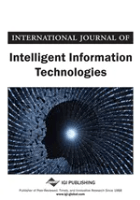
International Journal of Intelligent Information Technologies
Illuminating Trends in Intelligent Information Technologies.Founded in 2005, the International Journal of Intelligent Information Technologies serves as a pivotal platform for the dissemination of cutting-edge research in the fields of decision sciences and information systems. Published by IGI Global, this journal is dedicated to advancing the understanding of intelligent systems, data analytics, and technological innovations that drive modern decision-making processes. With an ISSN of 1548-3657 and an E-ISSN of 1548-3665, the journal is indexed strategically to ensure visibility among academia and industry professionals. Although it currently holds a ranking in the Q4 quartile of both decision sciences and information systems categories in 2023, it stands out for its comprehensive investigations into best practices and emerging trends in intelligent information technologies. It aims to provide readers with rigorous, peer-reviewed articles that offer practical insights and theoretical frameworks to facilitate informed decision-making in an increasingly data-driven world. Its commitment to quality research makes it an invaluable resource for researchers, professionals, and students alike who are eager to explore new dimensions of technology-assisted decision-making.

Science China-Information Sciences
Exploring the Intersection of Theory and Practical Application.Science China-Information Sciences is a prestigious academic journal published by SCIENCE PRESS, dedicated to advancing knowledge in the field of information sciences and computer science. Established in China, the journal has gained a remarkable reputation, with a 2023 category quartile ranking of Q1 in Computer Science (miscellaneous) and an impressive Scopus rank of #16 out of 232 in General Computer Science, positioning it within the 93rd percentile. The journal embraces a broad spectrum of topics, from theoretical frameworks to practical applications, providing a platform for researchers, professionals, and students to disseminate their findings and engage with the latest advancements in the field. With open access options available, Science China-Information Sciences ensures that innovative research is accessible to a global audience, fostering collaboration and interdisciplinary dialogue. The journal not only reflects the evolving landscape of information sciences but also plays a pivotal role in shaping future research directions.
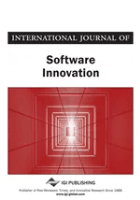
International Journal of Software Innovation
Driving Change Through Software Research and Collaboration.The International Journal of Software Innovation, published by IGI Global, serves as a crucial platform for disseminating cutting-edge research in the field of software engineering and innovation. With its ISSN 2166-7160 and E-ISSN 2166-7179, this journal has a broad scope that encompasses multiple areas of computer science, including Artificial Intelligence, Computer Graphics and Computer-Aided Design, Computer Networks and Communications, Software, and Computer Science Applications. Since its inception in 2017 and continuing until 2024, the journal has established itself in Q4 quartiles across various categories, reflecting both emerging trends and foundational principles in software innovation. Although it does not currently follow an Open Access model, its findings are vital for researchers, professionals, and students aiming to understand and contribute to the evolving landscape of software technologies. Located in the United States at 701 E Chocolate Ave, Ste 200, Hershey, PA 17033-1240, this journal not only offers research insight but also encourages collaboration and knowledge sharing among scholars worldwide.